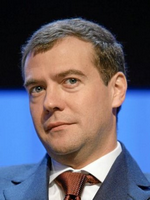Since taking office in May 2008, Russian President Dmitry Medvedev has made improving ties among the former Soviet republics that form the Commonwealth of Independent States (CIS) a foreign policy priority. Nonetheless, recent weeks have yielded further signs of Moscow's flailing leadership within the group.
Only five of the 10 heads of state, invited personally by Medvedev, participated in the latest annual informal CIS summit, held on July 18. The centerpiece of the event, as in past years, was attendance at the annual President's Cup horse race at Moscow's Central Hippodrome. Humorists blamed the large number of no-shows on Medvedev's recent decision to prohibit gambling at such events. More serious-minded Eurasian analysts saw it as the latest indication that the Russian government is encountering major difficulties leading the former Soviet bloc. All of the CIS leaders attended the three previous informal CIS summits.
Kazakhstan President Nursultan Nazarbayev dutifully appeared at this year's gathering. Nazarbayev continues to support Moscow's lead on many policy issues, including Russia's controversial decision last month to prioritize the formation of a CIS customs union over the consummation of Russia's long-delayed entry into the World Trade Organization. Presidents Serzh Sarkisian of Armenia, Ilham Aliyev of Azerbaijan, Emomali Rakhmon of Tajikistan, and Vladimir Voronin of Moldova also attended. Medvedev met privately with Sarkisian and Aliyev to continue his efforts to mediate the Armenian-Azerbaijan dispute over Nagorno-Karabakh, though without much apparent effect.

